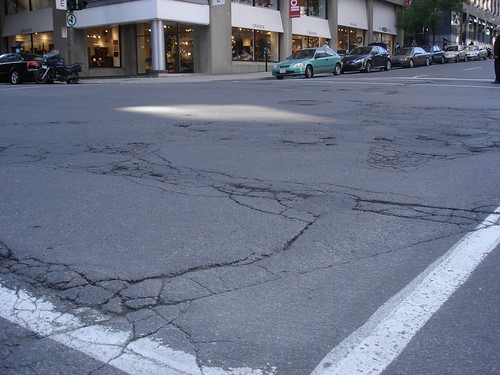
“Union & Président Kennedy” by Danny boy no-yes is licensed under CC BY-NC-SA 2.0
A spectre is haunting Kansas City— the spectre of potholes. The state of the roads in Kansas City has been conducive to the development of a revolutionary spirit wherein citizens demand reparations after months of dodging potholes. The stakes are stacked against the city government.
“We’re losing the pothole war really, really, really bad,” Raph Davis, Deputy Director of Public Works in Kansas City, admitted.
Last year’s particularly harsh winter, followed by an unusually rainy spring, has had lasting repercussions on the quality of Kansas City roads. Their functionality is measured by the Overall Condition Index (OCI), which requires a visual survey of the number and types of distresses, such as potholes or alligator cracking, in pavement. Then, after quantifying the number and extent of the distresses, roads are given an OCI value between 100 and zero, with 100 denoting excellent condition and zero denoting a need for the reconstruction of the road.
The city has estimated that bringing roads up to par would cost around $45 million. The 2019-2020 budget for potholes is $17 million. Budgetary deficits are not the only problem – currently, there are 30 positions unfilled in the public works sector of the Kansas City government, and much of the work is dependent on good weather conditions. Further, much of the equipment used is in need of maintenance or requires replacement altogether. The same employees who deal with potholes also deal with plowing the snow.
Another problem is that many Kansas City roads require more than just rejuvenations and patches. Many roads, particularly in a stretch on Volker Boulevard between Troost and Cherry, require complete rehabilitation or reconstruction. The city recognizes these needs and has created a Street Preservation Program that resurfaces streets across Kansas City after deliberation involving a “data driven approach, combined with decades of experience, engineering judgement [sic], and industry best practice.”
However, some citizens have felt that this program is not enough. One person leading this revolutionary cause is Waldo citizen Frank Sereno. He made the news in 2019 for posting a picture celebrating a pothole’s three-month birthday. Recently, Sereno has posted a video called “W.OR.S.T.! Waldo Off Street Training” on his Facebook page, wherein W.O.R.S.T was a fake business purporting to teach people about the worst, pothole-ridden driving routes in KCMO. Sereno has also started a change.org petition where he demands that the city find permanent solutions to the road conditions in Wornall, Holmes, and Gregory because he thinks the temporary solutions are mere bandaids on bullet holes.
Potholes, aside from being annoying to dodge and aesthetically unpleasant, are a real financial danger to Kansas City drivers. For example, Kansas City native Sam Adams had to pay $750 when his tire was blown out on a pothole. Avoiding a pothole can be particularly difficult in poor driving conditions, such as at night or in the snow. If a driver does end up damaging their car because of a pothole, insurance companies consider this an at-fault, negligent accident, which increases the cost of insurance premiums. Therefore, most individuals pay out of pocket for pothole-associated damages.
This means that drivers are less likely to traverse roads in bad conditions, which means a loss of revenue for businesses like Zarda Barbecue, owned by Terry Hyer. Hyer could be looking at a bill of $60,000 to fix up the parking lot around his restaurant.
What can the average Kansas City native do to combat the pothole problem? The city urges citizens to report potholes to 311. Before reporting the pothole, however, make sure to check the Kansas City pothole map to see whether or not the pothole has already been logged as needing attention. You can also file for damages to your car because of a pothole, but the city has to have known about the existence of the pothole before, and it is not common to receive compensation. In 2018, just four out of 44 claims were paid back. Finally, the issue of potholes and road maintenance has become increasingly important in Kansas City politics. Stay informed on any changes to the budget and what mayoral candidates’ official positions regarding road maintenance is.
Things could be looking up for Kansas City roads. As of Jan. 13, 18,859 potholes that were reported to 311 have been patched. However, more than 1,700 potholes still need to be filled.
